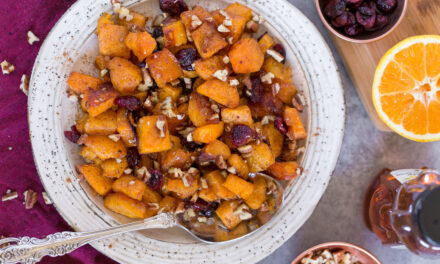Food As Medicine—What Does That Really Mean?

Food and medicine tend to be viewed separately. Yet, this divide is artificial. After all, a healthy diet can help prevent and treat disease, according to Erica Zellner, M.S. CNS, Health Coach, Parsley Health. Read on for an informative Q&A to learn more, from the ideal way to glean nutrients to whether how much we eat can contribute to our overall wellness.
Q: Do you consider food as medicine? If so, why?
A: I agree with many experts that food can be argued to be medicine. This doesn’t mean that diet should replace medical intervention in all circumstances, but I firmly believe that diet needs to at least be considered in all circumstances. That’s because what you eat has a profound effect on your health, either in a positive or negative way. Hundreds of studies show that dietary habits will influence disease risk, certain foods are more common triggers for chronic health conditions, and others offer strong medicinal properties.
Q: What’s the body’s preferred way of gleaning nutrients: food or supplements?
A: The short answer is that our bodies prefer, and our health benefits when we consume the majority of our nutrients from whole foods. That doesn’t mean there’s no place for supplements in health, actually quite the opposite. But you’ll never out-supplement a nutrient-poor diet.
Nutrition is not a mathematical equation, in which two plus two is four. The food we put in our mouths doesn’t control our nutrition—not entirely. What our bodies do with that food does. And this is a little more nuanced. Because the fact is, our bodies are incomprehensively complex. If, for example, I consume 100 milligrams of vitamin C at one meal, and 500 milligrams at a second meal, this does not mean that the second meal leads to five times as much vitamin C reaching the tissue where it works. Ultimately, the proportion of a nutrient that is digested, absorbed, and provided to various tissues and the cells in those tissues is mostly dependent on the body’s need for that nutrient at that moment in time. And the body is constantly sensing what is needed and acting accordingly.
Additionally, we have to consider the complexity of nutrient interactions. And this is something that I don’t believe science will ever replicate as well as nature does. There are two competing philosophies in nutrition theory: Wholism or Reductionism. Reductionism believes that the whole is the sum of its parts. Wholism believes that the whole is greater than the sum of its parts. In reality, we can never know the ideal amount of a specific nutrient a person needs. The need for a nutrient is dependent on so many complex variables (i.e. digestion, absorption, storage, excretion, etc.). We will never be able to determine the amount of a nutrient that gets to the functional part of a cell. Plus, the way nutrients interact within a particular food is incredibly complex.
Q: Is food ever used as medicine, and, if so, how?
A: Yes, absolutely. As a Clinical Nutritionist, I use diet and lifestyle as the first step in beginning to heal my patients. Many studies look at varying diets and their effect on health. For example, the Mediterranean diet, which is rich in healthy fats, vegetables, fish, and some whole grains, is linked to a reduced risk of heart disease, neurodegenerative conditions, diabetes, some cancers, and obesity. Then we have diets that are created to treat conditions, like the Autoimmune Protocol (AIP) diet. This diet removes foods that have a higher likelihood of causing an immune response for autoimmune patients. Celiac disease requires the exclusion of gluten. Epilepsy that doesn’t respond to medication may improve with a ketogenic diet in children.
It’s definitely worth noting, however, that although some dietary choices can prevent or increase your disease risk, not all diseases can be prevented or treated through diet alone. Disease state is complex, and many factors will also influence a person’s individual situation (like stress, genetics, pollution, geography, occupational hazards, sleep, drug or alcohol use, etc.).
Q: Can it help to adjust how much food we consume?
A: Fasting is fascinating. There are a number of incredible benefits to the practice for most people. If we take only inflammation as a marker to watch, then fasting is a great practice to include in most people’s regular lives. We know that inflammation is involved in the development of many chronic conditions (like heart disease or cancer). In one study that looked at adults fasting during Ramadan, researchers found intermittent fasting significantly decreased inflammatory markers. But there are many other places where fasting is beneficial.
Many studies have shown that fasting can improve blood sugar control and reduce insulin resistance. Other studies show promising use of fasting as a way to prevent or improve outcomes of conditions like Alzheimer’s and Parkinson’s diseases. Fasting might also promote autophagy, which is the body’s way of cleaning up damaged cells and replacing them with new, healthy cells.
It’s worth noting that fasting is not appropriate for everyone. Fasting is contraindicated for individuals with disordered eating patterns and active eating disorders, pregnant women, low body weight, Type 1 Diabetes, and a number of other disease states. It’s imperative that you discuss your interest in fasting with your doctor, qualified nutritionist, or other health care provider before beginning a fasting regimen.
Q: What are some examples of how what we eat and drink can prevent and treat disease?
A: Cruciferous veggies (like broccoli, bok choy, and cauliflower) contain a compound called DIM- Diindolylmethane, which increases “good” estrogen metabolites (this means that the estrogen will go down the 2-hydroxy estrone pathway in the liver) and lowers “bad” estrogen metabolites, which helps balance hormones. Estrogen dominance is a risk factor for the development of breast cancer.
Fatty fish (like salmon, mackerel, sardines, and arctic char) help lower inflammation due to their high Omega-3 content. This is protective of many diseases, but very notably heart disease, which accounts for approximately 30% of deaths globally.
Medicinal mushrooms are having a serious moment right now. Chaga mushrooms are rich in antioxidants, which help fight free radicals, lower inflammation, combat oxidative stress, and can slow the growth of cancer. Shiitakes may have an impact on LDL (“bad”) cholesterol, and Reishi may play a role in boosting the immune system.
Q: What about science-backed examples of how what we consume can contribute to disease?
A: The most notable, and possibly one of the most well-studied examples, is sugar. A diet high in refined sugar is associated with an increase in the release of free radicals and proinflammatory cytokines, which can induce inflammation and vascular damage. This is bad news for overall health, but refined sugar is even worse if you have cancer. Many types of cancer cells have plenty of insulin receptors, making them respond more than normal cells to insulin’s ability to promote growth.
Salt is another food that gets a lot of attention, especially when considering the millions of people with high blood pressure. Salt helps balance our fluid levels, helps our nerves transmit impulses, and enables our muscles (including our heart) to contract and relax. However, in hypertension, additional salt can quickly worsen the disease. On the reverse, a low-sodium diet can help to lower blood pressure levels. The body needs to maintain a 3:1 potassium to sodium ratio, so eating potassium-rich foods like bananas can also help!





